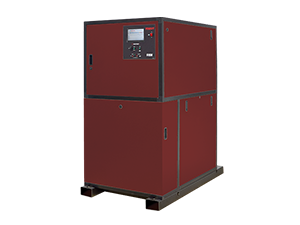
The variety of boilers on the market can make searching for a new one a complicated task. If efficiency tops your wish list, consider a condensing boiler. Condensing boilers are more efficient than non-condensing boilers, given the right water temperatures and building conditions.
There are two primary categories of condensing boilers: firetube and watertube. Firetube boilers generate heat by pumping hot gas through tubes submerged in water. Watertube boilers do the opposite; water flows through tubes arranged inside a furnace filled with hot gas.
While the systems are essentially the inverse of one another, some key differences exist between the two when it comes to performance and reliability. The right fit will, of course, vary by application and needs. That said, watertube boilers are, overall, the superior choice when it comes to condensing boilers. Below are three main reasons why.
1. Greater Efficiency & Better Performance
Watertube boilers produce heat more quickly than firetube boilers and are far more efficient. It all boils down to the amount of water needed by each model to produce heat.
Because the entire tank of a firetube boiler needs to be filled with water (as opposed to just the tubes in a watertube boiler), the firetube boilers use significantly more water than watertube boilers. Since watertube boilers require less water, they generate heat more quickly than firetube boilers. So, in addition to saving water, watertube boilers also limit the amount of fuel needed to operate.
The volume and distribution of water also impacts the performance of both types of boilers.
A firetube boiler’s tubes typically run vertically through the water, so heat generally becomes concentrated at the top of the boiler and gradually grows cooler near the bottom. This results in heat being unevenly distributed throughout the water in the tank.
A watertube boiler’s tubes run vertically and are uniformly surrounded by heat. This results in an even distribution of heat throughout the water and, ultimately, better performance overall.
2. Superior Reliability
When most people think of firetube boilers, they envision something like the old Scotch marine boilers that were made from ¼” steel plate, held 500 gallons, used in steam-powered ships, and could handle just about anything thrown at them.
Today’s firetube boilers only hold 12 gallons and aren’t nearly as forgiving. In fact, they tend to be rather finicky and high maintenance. Because hot gas flows directly through the tubes, their stainless steel construction expands and contracts and is sensitive to fluctuations in water temperature, volume and flow rate. Changes to the water fed into the boiler can cause the metal to expand or contract too rapidly, which can lead to leaks in the welds and, sometimes, total failure.
Watertube boilers do not have the same vulnerabilities and are much more dependable. Their design – which has been on the market for over a decade – has been proven to be trouble-free and ultra-reliable.
3. Longer Lifespan & Better Overall Value
Watertube boilers tend to have longer lifespans than firetube boilers. Both are made with stainless steel, which is very difficult to weld.
Because there are many welds in firetube boilers and the difference in heat is so much greater over the length of the heat exchanger, it’s common for heat exchangers in firetube boilers to leak or wear out after only a few years of use. Aside from the cost of a new heat exchanger, boiler failure can be a serious issue, especially if it occurs in the middle of winter.
Because its design has few to no welds inside the boiler and an even heat distribution across all tubes, watertube boilers are much less prone to failure. The dependability and longevity of watertube boilers make them a better value and a headache-free option, especially for installations needing 4 million BTU or less.
If your installation requires more than 4 million BTU, firetube boilers are rated for up to 6 million BTU and may be required for larger buildings. To prevent heat exchanger leaks and failures, carefully designed piping is required along with installation of a hydraulic separator instead of closely spaced Ts to ensure the secondary and primary loop are close and there is no pressure drop between them. A dedicated pump per boiler is also recommended.
Get a Quote Today
Maddock Industries is an authorized distributor of RBI boilers, water heaters and replacement parts. The RBI Torus watertube boiler is an efficient, high-performing, easy-to-service watertube boiler with a small footprint.
For more information about watertube boilers or the RBI Torus boiler, speak with one of our boiler and hydronics experts.
